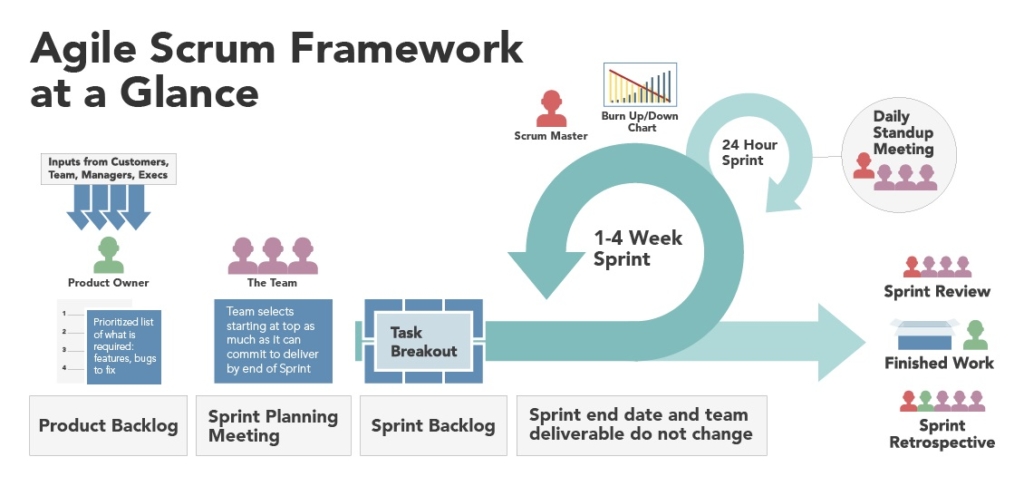The Benefits of Agile Methodology
Agile methodology has gained significant popularity in the software development industry due to its flexibility and effectiveness in managing complex projects. In this article, we will explore the numerous benefits of adopting agile methodology and how it can positively impact your organization’s productivity and success.
Improved Project Visibility and Control
One of the key advantages of agile methodology is its emphasis on transparency and frequent communication. Agile teams work in short iterations called sprints, where progress is regularly reviewed and evaluated. This iterative approach allows project stakeholders to have a clear understanding of the project’s status, potential risks, and any necessary adjustments that need to be made. With increased visibility and control, organizations can make informed decisions and respond quickly to changing requirements, resulting in higher project success rates.
Increased Adaptability to Change
Agile methodology promotes adaptability, enabling teams to respond effectively to changing market conditions and customer needs. Unlike traditional waterfall approaches, where changes can be difficult to incorporate, agile allows for flexibility and encourages continuous improvement. By breaking down projects into smaller, manageable tasks, agile teams can quickly adapt and pivot their strategies based on feedback and evolving requirements. This adaptability ensures that the final product meets the customer’s expectations and remains competitive in a rapidly changing business landscape.
Enhanced Collaboration and Communication
Agile methodology fosters a collaborative work environment, bringing together cross-functional teams that include developers, designers, testers, and stakeholders. By promoting frequent and open communication, agile teams can share knowledge, exchange ideas, and address challenges collectively. This collaborative approach not only improves the quality of the end product but also enhances team morale and engagement. With everyone working towards a common goal, organizations can achieve higher levels of productivity and innovation.
Early and Continuous Delivery of Value
Another significant benefit of agile methodology is its focus on delivering value early and consistently throughout the project lifecycle. By breaking down projects into smaller increments, known as user stories, teams can prioritize and deliver the most valuable features first. This iterative delivery approach allows organizations to gather feedback from users and stakeholders early on, ensuring that the final product meets their expectations. Early value delivery also provides organizations with a competitive advantage by allowing them to release market-ready products faster, gaining customer loyalty and market share.
Increased Customer Satisfaction
Agile methodology places a strong emphasis on customer collaboration and involvement throughout the development process. By involving customers in frequent reviews and demonstrations, agile teams can gather valuable feedback and ensure that the end product aligns with their expectations. This customer-centric approach not only leads to higher customer satisfaction but also reduces the risk of developing a product that fails to meet market demands. By continuously engaging with customers, organizations can build strong relationships, foster loyalty, and drive business growth.

Agile methodology offers numerous benefits that can significantly impact an organization’s success in project delivery. By embracing agile principles and practices, organizations can improve project visibility and control, adapt to changing requirements, enhance collaboration and communication, deliver value early and consistently, and ultimately increase customer satisfaction. As the business landscape continues to evolve, adopting agile methodology has become essential for organizations seeking to stay competitive and drive innovation.
Frequently Asked Questions about the Benefits of Agile Methodology
1. What is agile methodology?
Agile methodology is an iterative and incremental approach to project management and software development. It emphasizes flexibility, collaboration, and continuous improvement.
2. What are the key benefits of using agile methodology?
The key benefits of using agile methodology include improved project visibility, faster delivery of value, increased adaptability to changes, enhanced team collaboration, and higher customer satisfaction.
3. How does agile methodology improve project visibility?
Agile methodology improves project visibility by breaking down the work into smaller, manageable tasks called user stories. These user stories are then prioritized and tracked using a visual board, such as a Kanban board, allowing teams to have a clear view of the project’s progress.
4. How does agile methodology enable faster delivery of value?
Agile methodology enables faster delivery of value by focusing on delivering working software in short iterations called sprints. This allows teams to gather feedback early and incorporate it into subsequent iterations, ensuring that valuable features are delivered quickly.
5. How does agile methodology increase adaptability to changes?
Agile methodology increases adaptability to changes by embracing the concept of continuous improvement. Through regular iterations and frequent customer feedback, teams can easily adapt to changing requirements, market conditions, and customer needs.
6. How does agile methodology enhance team collaboration?
Agile methodology enhances team collaboration by promoting cross-functional teams that work together closely throughout the project. Regular meetings, such as daily stand-ups and sprint reviews, encourage communication, knowledge sharing, and collective decision-making.
7. How does agile methodology contribute to higher customer satisfaction?
Agile methodology contributes to higher customer satisfaction by involving customers throughout the development process. Continuous feedback and early delivery of valuable features ensure that customer requirements are met, leading to increased satisfaction and a higher-quality end product.
8. Can agile methodology be applied to non-software projects?
Yes, agile methodology can be applied to non-software projects as well. The principles and practices of agile, such as iterative development, frequent feedback, and collaboration, can be adapted to various industries and project types.
9. Are there any potential challenges in adopting agile methodology?
Yes, there can be challenges in adopting agile methodology. Some common challenges include resistance to change, the need for experienced agile practitioners, and the requirement for effective communication and coordination among team members.
10. How can organizations successfully transition to agile methodology?
Organizations can successfully transition to agile methodology by providing adequate training and support to their teams, fostering a culture of collaboration and continuous learning, and gradually implementing agile practices while addressing any challenges that arise.




